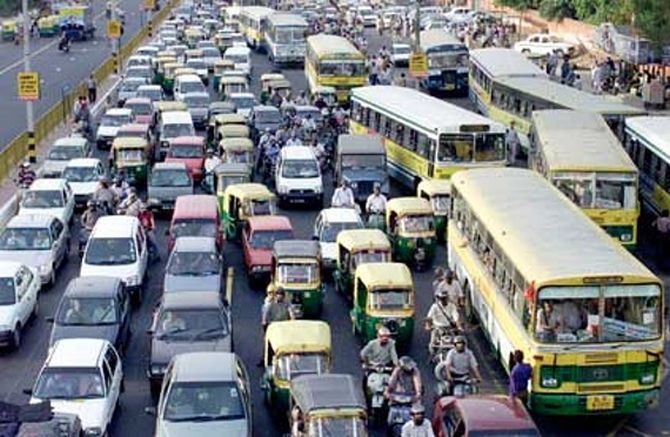 | « Back to article | Print this article |

Now that the second phase of the odd-even scheme in Delhi is over, Chief Minister Arvind Kejriwal wants to project it as a success, with an eye on the Punjab polls next year, says Kavita Chowdhury.
Even as Delhi Chief Minister Arvind Kejriwal celebrated the ‘success’ of the second instalment of the odd-even scheme at the packed Chhatrasal Stadium on May 4, he was circumspect. “We have to strengthen the public transport system; we are working on it,” he said. “Odd-even cannot be a long-term remedy.”
The Aam Aadmi Party government’s novel experiment to curb pollution by rationing private vehicle use -- allowing only odd-numbered vehicles to ply on odd days and only even-numbered vehicles on even days -- in the congested national capital was dismissed as a gimmick by political opponents.
However, international acclaim for Kejriwal -- Fortune magazine ranked him among the world’s 50 greatest leaders -- and his intention to tackle pollution offered the much-needed affirmation to go ahead with the scheme. The Delhi government thus followed up the pilot run of the scheme in January with a second stint from April 15 to 30.
At the thanksgiving ceremony on May 4, Kejriwal and Transport Minister Gopal Rai reminded the assembled civil defence workers, Delhi traffic personnel and volunteers that the opposition had tried its best to ‘sabotage’ the scheme. Despite such attempts, Rai claimed, the “success of the second phase was 99.6 per cent -- five per cent more than the first phase in January”.
While the jury is still out on the efficacy of the scheme in reducing pollution, critics say pollution data do not corroborate the state government’s claims. The latest report by the Centre for Science and Environment, however, was a shot in the arm for the state government. It stated that while “air pollution took a dip during the first 10 days of the scheme, it registered a sudden spike April 22 onwards due to crop burning in neighbouring Punjab and Haryana". CSE said attacks on the scheme were intended to help the auto industry argue that vehicles did not contribute to pollution.
The over one-year-old AAP government publicised the scheme to the hilt, as another step in its efforts to provide ‘governance with a difference’. Full-page print advertisements followed.
It became imperative for the AAP government to claim the scheme was a ‘success’, considering the criticism it had faced. With Parliament in session, it faced stiff opposition from members of Parliament. Bharatiya Janata Party members took the lead: Ram Prasad Sharma came on horseback to Parliament; Vijay Goel was fined for traffic violation.
Besides political resistance, there were legal hurdles. The scheme was challenged in the Delhi high court which declined to grant a stay order on the petition.
The Kejriwal government also drew flak for ‘surge pricing’ that cab aggregators such as Uber and Ola were resorting to more frequently due to the increased demand for cabs.
In a knee-jerk reaction, to assuage the public, Kejriwal banned ‘surge pricing’ during the duration of the scheme.
Rejecting the charge of the opposition that the common man was inconvenienced by the scheme, Kejriwal declared at the ‘thanksgiving’ ceremony that his government was determined to beef up public transport in the city within a year. He was astute enough to realise that without strengthening the existing public transport network in the capital, experiments like odd-even would not be tenable. He emphasised that the government would soon prepare a policy for cab and bus aggregators that would see more taxis and buses on the roads.
What has come as a setback for the government is the Supreme Court ban on diesel taxis in Delhi, which took 30,000 cabs off the roads. No wonder the government indicated that the odd-even scheme won’t be repeated before winter.
The AAP still wants to cash in on the scheme, though. Party spokespersons touted it as a ‘victory of participatory governance’. On the heels of a participatory budget-making exercise, the odd-even scheme was another instance of ‘Delhi showing the way’, they said.
It’s not hard to see why the party is selling the ‘success’ of the scheme, considering that it hopes to come to power in Punjab, which goes to the polls next year. AAP’s Punjab convenor, Sucha Singh Chhotepur, tweeted, “@AamAadmiParty will start the same odd-even scheme in Punjab also alike in Delhi, if voted to power in 2017.”
With the World Health Organisation declaring Delhi as one of the most polluted among 160 cities across the world, the Delhi government has its task cut out: to evolve a workable solution to pollution that rises above rhetoric and politics.